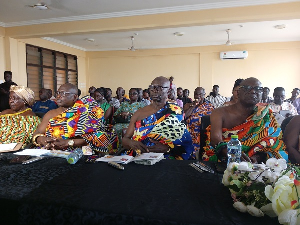The Nifa Division of the Akuapem Traditional Area in the Eastern Region is the next stop of the Ghana State Book Project.
A delegation of the Ghana State Book Board met with the Akuapem Golden Members Committee on Sunday, July 21, 2024, to introduce and discuss the Ghana State Book Concept with the traditional leadership.
The meeting also allowed the board to solicit their support and cooperation for the exercise.
The committee, as part of its mandate to write the history of all paramountcies nationwide, met with the traditional leadership at the assembly hall of the Okere District Assembly at Adukrom, where it engaged in extensive deliberations with the chiefs, including Osuodumgya Otutu Ababio V, the Adukromhene, and Akuapem Nifahene, together with chiefs from the Nifa Division.
The five Akuapem divisions include the Kronti (Akropong), Adonten (Aburi), Gyase (Amanokrom), Nifa (Adukrom), and Benkum (Larteh) divisions.
Having completed the State Books of some paramountcies across the country, the attention of the committee now lies on the people of Nifa Division, where the committee seeks to work closely with the chiefs and people to unearth its true history.
The committee, in collaboration with the National Commission on Culture, the National House of Chiefs, the Chieftaincy and Religious Institution, and the Ghana Bureau of Languages, has already completed the Awutu, Techiman, Offinso, Hwidiem, Tepa, and Kwahu Traditional Areas, among others, with Akuapem, New Juaben, Akwamu, and Dormaa forming part of its next project.
Previously known as the Ghana History Books, it became imperative in 2013 to change the name to Ghana State Books to underscore its significance as not just a reference point for history aimed at straightening records but a citadel of broader cultural and customary reference manuscripts of all traditional areas.
The intended Akuapem State Book forms part of the targeted 15 books covering 15 traditional councils to be written between 2023 and 2024.
A certificate of commencement was presented to the chiefs to signify the preparedness of the committee to start the Nifa State Book project.
A member representing each of the divisional areas would form part of the review committee to provide the necessary information required to write the book.
Osuodumgya Otutu Ababio V, in an interview after the meeting, praised the objectives of the project.
“Litigation has been high in recent times—litigations over land ownership, litigation over chieftaincy,” he asserted, adding that the project would go a long way toward addressing such differences.
According to him, oral history has been full of inaccuracies, and he expressed his confidence that the Nifa book project would document an accurate version of history.
The Nifahene affirmed the preparedness of the chiefs to support the Ghana State Book Board in undertaking the project.
Though he expressed reservations over the National Coordinator of the Ghana State Books project, Mr. Isaac Bright Botchway, in an interview, stressed the need to write down accurate information.
Mr. Botchway, who said the initiative was long overdue, underscored the need to pen down correct information to serve its purpose of enabling unity and not to create discord within any group.
Underscoring the essence of the project, Mr. Botchway said, “It’ll help cleanse and straighten important information. It is important to write down accurate information; there’s the potential for conflicts if facts are twisted,” said the national coordinator.
He furthered that, though chieftaincy disputes sometimes posed difficulties to the work of the committee, they always devised a peaceful approach to address such issues to ensure that they succeeded in their quest.
He urged the various traditional authorities to ensure that historical and customary facts are not misrepresented but maintained.
Though many history books have been previously published, the uniqueness surrounding the Ghana State Books stems from the unified endorsement from the respective traditional councils.
The book, after completion, would be stocked in the various traditional collections for use by the judicial committees to serve as a constitution to guide and serve as a reference point for them during adjudications.
Regional News of Monday, 29 July 2024
Source: Michael Oberteye, Contributor

















